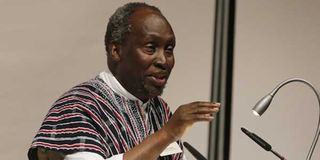Epic of Gikuyu and Mumbi earns Ngugi Booker Prize nomination

Prof Ngugi wa Thiong'o speaks at the University of Bayreuth in 2014.
We’ll do anything to watch a sunset on a clear day at the beach. We’ll stand and stare and remain silent, as suffused shades of orange stretch over the horizon.
Meanwhile, the sun, like a painter who keeps changing his mind about which colours to use, finally resolves everything with shades of pink and light yellow, before sinking, finally, into stunning whiteness.
Suddenly, we are marvelled and uplifted, pulled out of our small, ordinary lives and taken to a realm far richer and more eloquent than anything we know. Call it enchantment, the difference between the time-bound and the timeless, between us and the otherworldly.
All beauty and art evoke harmonies that transport us to a place where, for only seconds, time stops and we are one with the world. It is the best life has to offer. Under the spell of beauty, we experience a rare condition called plenitude, where we want for nothing.”
These words on the quest for the beautiful, the ideal and the perfect by André Aciman remind one of Ngũgĩ's book, The Perfect Nine: the epic of Gĩkũyũ and Mũmbi, which made Ngũgĩ on March 30, 2021 to become the first author and translator nominated for the International Booker Award.
The Perfect Nine, originally written in Gĩkũyũ and translated by the author into English, is based on the famous Gĩkũyũ creation myth and like all myths, it pulls us out of our small, ordinary lives into “a realm far richer and more eloquent than anything we know”.
It’s a tale about beauty and perfection lit up in fairy-tale radiance; the picturesque and romantic kind that always somehow eludes us in real life. The beauty and the heroic gravitas of the events are, of course, exaggerated. Everything seems new and fresh, like the scintillating smell of the grass after the rain, invoking memories of childhood.
Inspiration
The author writes about his inspiration, “The epic The Perfect Nine is an interpretation of that myth starting from a question: where did the...suitors come from? I imagined them as the last left standing after others failed tests of character and resolve.”
The Perfect Nine is a strange and varied tale told in verse: “I will tell the tale of Gĩkũyũ and Mũmbi /And their daughters, the Perfect Nine/Matriarchs of the house of Mũmbi/Founders of their nine clans/Progenitors of a nation.” About the daughters of Gĩkũyũ and Mũmbi (called the “Perfect Nine”), the narrator says that, “Young men lost sleep in dreams of the beautiful ones— and dozens of suitors come to court them”.
However, the 99 suitors had to endure overwhelming odds. The daughters and their 99 suitors are dispatched into what turns to be a very dangerous journey. This journey is akin to Odysseus’ journey in Homer’s book entitled The Odyssey.
The Odyssey is about the crafty warrior Odysseus as he attempts to go back home to Ithaca after fighting a 10-year war at Troy. It features one-eyed ogres, shipwrecks, ghosts and otherworldly creatures that are both mystical and terrifying.
The Perfect Nine also features terrifying creatures from crocodiles to menacing ogres. In both The Odyssey and The Perfect Nine, the journeys are allegorical. In The Perfect Nine, for instance, the physical features like snow and volcanoes and the frightening mythical creatures represent the trials and challenges of the journey of life.
The myth is a brutal metaphor; cruelly apt for our lives in a turbulent world. However, life goes on just like for the suitors who are attacked by frightening creatures and many of them die but the surviving ones press on. In the end, the survivors marry the beautiful daughters and that’s the beginning of the nine clans of the Gĩkũyũ people.
Folklores
By writing The Perfect Nine, Ngũgĩ has elevated the place of African traditional myths and folklores, especially their ability to capture the human condition. That even today, there are still many positive lessons and inspiration on life that people can draw from the stories our grandparents told us many years ago.
In a world ravaged by conflict, sometimes refugees and immigrants have to physically leave their countries and embark on treacherous journeys that look like the ones described in The Perfect Nine and other myths. For those who don’t have to endure physical journeys, they still have to deal with metaphorical journeys of life that test and try them in almost the same way characters in the tale were tested.
The Perfect Nine has a timeless message and we wish Ngũgĩ success as he competes in the International Booker Prize.
In a world in which the young generation is always looking out for superheroes, myths have been a source of many superheroes. The Perfect Nine will hopefully inspire many other new books based on our many Kenyan myths and also provide content for more movies with African-based content.





